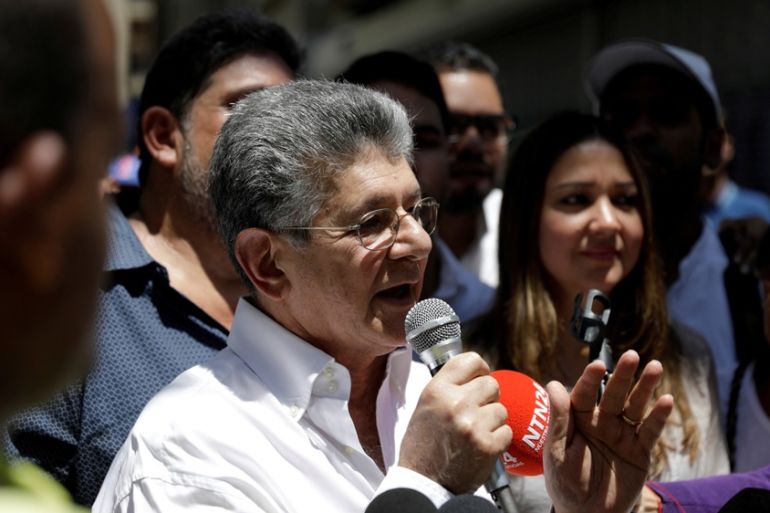Venezuela’s top court targets opposition leaders
The Supreme Tribunal asks ruling Constituent Assembly to examine the possibility of lifting seven politicians’ immunity.

Venezuela‘s supreme court, the Supreme Tribunal, has said it asked the country’s Constituent Assembly, a pro-government legislative super body, to determine whether to open criminal proceedings against seven opposition politicians.
In a statement on Facebook, the court said on Tuesday that the assembly would determine if proceedings could be opened to investigate crimes including conspiracy, treason, and rebellion, without detailing which actions the politicians had taken that could be considered criminal.
Keep reading
list of 4 itemsVenezuela opposition figure Guaido in Colombia ahead of summit
Venezuelan court issues warrants for new opposition leaders
Venezuelan government, opposition to resume political talks
The politicians include Henry Ramos Allup, a former National Assembly president.
In April, following a similar request from the Supreme Tribunal, the Constituent Assembly approved a measure allowing for a future trial of opposition leader Juan Guaido.
Guaido, head of the opposition-controlled National Assembly, in January, invoked Venezuela’s constitution to declare himself interim president, saying President Nicolas Maduro‘s 2018 re-election was illegitimate.
The United States and most other Western nations have recognised Guaido as Venezuela’s legitimate leader.
He has said he does not recognise decisions emanating from the Maduro government, including the Constituent Assembly, which is controlled by the ruling Socialist Party.
On April 30, Guaido tried to spark a military uprising to overthrow Maduro, but there were no widespread defections among soldiers and the plan fizzled out. Maduro denounced it as a coup attempt.
Ramos, speaking earlier at the National Assembly, said, “Whatever action the prosecutor’s office imposes is null and void because there is no prosecutor’s office.”
Pence says US to lift bans on Venezuelan general
Meanwhile, on Tuesday the Trump administration decided to lift sanctions on Venezuela’s former chief of the Bolivarian Intelligence Service, Manuel Cristopher Figuera who last week supported the opposition.
“We hope this action will encourage others to follow the example of General Cristopher Figuera and other members of the military,” Vice President Mike Pence said in a speech prepared for a conference at the State Department.
Pence also warned the 25 Venezuelan supreme court magistrates.
“If the supreme court of Venezuela does not return to its constitutional mandate to uphold the rule of law, the United States will hold all 25 of its magistrates accountable for their actions,” Pence added.
Venezuela’s opposition-controlled National Assembly also met on Tuesday to discuss a proposal for the country’s return to a regional defence agreement that dates from the Cold War – a move that could provide political cover for greater international involvement in the nation’s crisis.
The matter was referred to an assembly committee.
In 2012, Venezuela and other left-governed country had pulled out of the US-led defence pact, the Inter-American Treaty of Reciprocal Assistance.
US officials have repeatedly said they are considering military “options” in the Venezuelan crisis in addition to diplomatic and economic pressure that has been intensifying for months against Maduro.
Military police prevented journalists from entering the National Assembly, and some reporters were harassed by government supporters outside the building.
Venezuela’s state-run internet provider restricted access to YouTube, some Google services and other streaming platforms during the assembly session.
Confirmed: YouTube, Google services and Bing restricted in #Venezuela from 4:03 p.m. UTC (12:03 p.m. VET) during live-streamed National Assembly session; incident ongoing #AsambleaVE #7May #KeepItOn ⬇️https://t.co/EC9yh7NBbe pic.twitter.com/td1k18C4mf
— NetBlocks.org (@netblocks) May 7, 2019
The South American country is mired in a deep economic crisis despite its vast oil reserves. Shortages of food and medicine have prompted more than three million Venezuelans to emigrate in recent years.
The slump has worsened this year with large areas of territory left in the dark for days at a time by power outages.
“My mother doesn’t have medicine, my economic situation is terrible, my family has had to emigrate. We don’t earn enough money. We have no security. But we are hopeful, and I think that this is the beginning of the end of this regime,” said Jose Madera, 42, a Venezuelan mechanic.
The EU-backed International Contact Group on Venezuela said it was essential to avoid escalating tensions in Venezuela, and that a resolution to the political and economic crisis in the country should be pursued via elections.